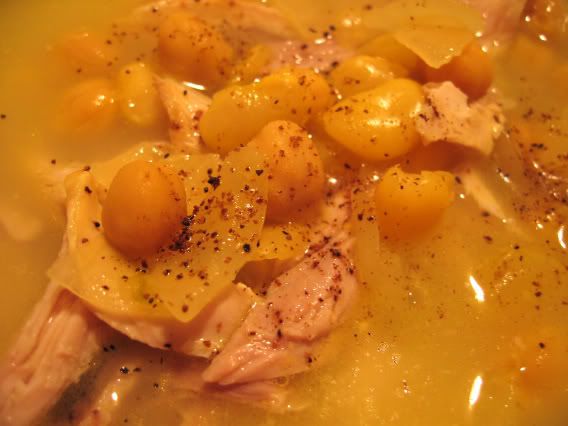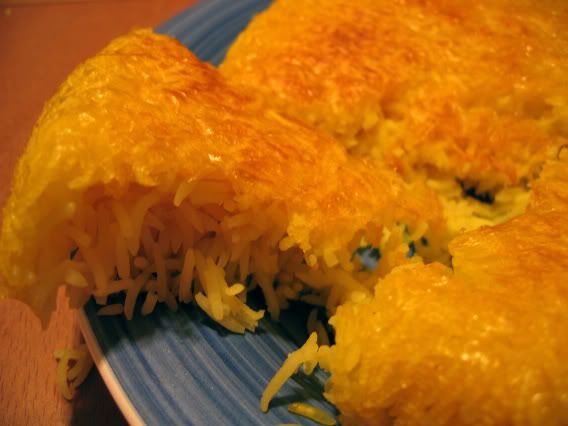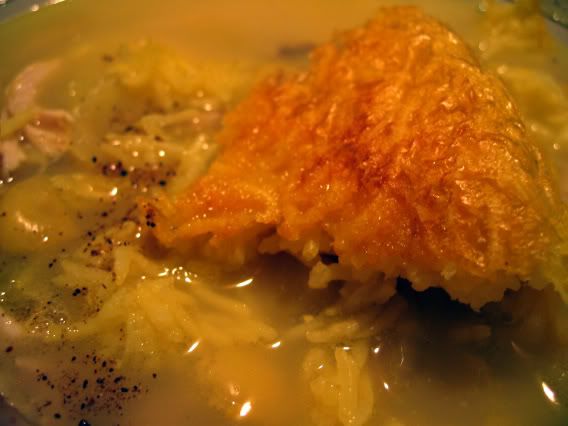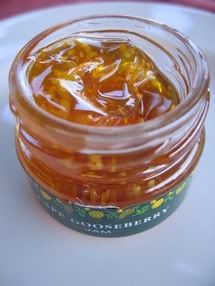Lovely, Lemony Persian Chicken Soup
 Spring is definitely in the air, and the university is abuzz with excitement. Rhode Island springs are notoriously unreliable, and in past years, the weather has remained cold, wet and generally miserable as late as mid-May. So it came as no surprise when we backslid into winter yesterday. I didn’t feel too sad, though, because the weather persuaded the Persian Princess to take a break from her MCAT studies, and hit the kitchen. And when the Persian Princess cooks, it’s inevitably Persian food.
Spring is definitely in the air, and the university is abuzz with excitement. Rhode Island springs are notoriously unreliable, and in past years, the weather has remained cold, wet and generally miserable as late as mid-May. So it came as no surprise when we backslid into winter yesterday. I didn’t feel too sad, though, because the weather persuaded the Persian Princess to take a break from her MCAT studies, and hit the kitchen. And when the Persian Princess cooks, it’s inevitably Persian food.I knew nothing about Iranian food before I met the Princess; if you’d asked me, I no doubt would have given some vague response about shish kebabs and shwarma, and other ‘generic’ Middle Eastern food. But Iranian cuisine is, well, different. With a culinary sophistication inherited from the mighty Persian Empire, Iranian food encompasses a wealth of dishes, flavours and ingredients. It’s rich in complex seasonings and subtle sauces, with an affinity for sweet and sour flavours (which explains the Princess’s addiction to rose water and lemons), and a fondness for herby, fruity stews, fire-roasted meats, nut- and fruit-studded rice, and savoury, creamy egg dishes. This is the food of One Thousand and One Nights, redolent with saffron and rose petals. And while this is all second nature to the Princess, it’s wonderfully exotic to me. I like nothing better than to visit her family for religious holidays, when I get to sample authentic Sephardic-Persian festive dishes.
After one overnight visit, the Princess awoke to find me eating three different types of stew for breakfast. While I am still teased about it today, I maintain that only a person without taste buds - or, like the Princess, someone who has constant, enviable access to Persian food – would have had toast for breakfast when there were stews of fennel and lamb, beef and quince, and herbs and fish waiting in the fridge.
Unfortunately, Persian food is not that simple to recreate at home; a lot of dishes require hard-to-find ingredients (barberries, dried whole limes, angelica, etc.) or a lot of time (ever tried deseeding twelve pomegranates by hand?). So imagine my delight when the Princess made a dish that anyone, with a minimum of ingredients and equipment, could make at home. So it is with much joy that I present to you: Ab Gosht.
 The direct translation from Farsi is, “Water Meat”. Which is a pretty accurate description of chicken soup, if somewhat unromantic. If I had to give it a name, I’d say something like: Golden Chicken Soup, or, Lemony Chicken and Legume Stew. But then the Princess would give me a name, and it wouldn’t be so complimentary. As it is, I struggled to get her to give me anything resembling a recipe, because there is no one right, measured way to recreate this dish. Since she insists that every person makes it differently, I present to you… the Persian Princess’s Ab Gosht.
The direct translation from Farsi is, “Water Meat”. Which is a pretty accurate description of chicken soup, if somewhat unromantic. If I had to give it a name, I’d say something like: Golden Chicken Soup, or, Lemony Chicken and Legume Stew. But then the Princess would give me a name, and it wouldn’t be so complimentary. As it is, I struggled to get her to give me anything resembling a recipe, because there is no one right, measured way to recreate this dish. Since she insists that every person makes it differently, I present to you… the Persian Princess’s Ab Gosht.Take a whole chicken, and rub its skin with turmeric, salt and pepper. Put it in a large pot. Add one large, roughly chopped onion, and two cups of dried, white beans; this time, she used a combination of lima and great northern beans. Whatever you have in the pantry – navy, cannelli, haricots, white kidneys, no-name-nondescript – is fine. If you like, you can add a couple peeled, chopped up potatoes, too. Add enough cold water to just cover the chicken. Cover the pot, and place over medium-high heat. When the water comes to the boil, lower the heat to medium, and simmer for two hours. Towards the end of the cooking time, add one drained can of chickpeas,and the juice of three lemons. Simmer for only another five to ten minutes (you don’t want the lemon juice to lose its sparkle), and remove from the heat. The chicken meat should almost fall off the bone when you prod it with a fork. Either break the chicken into more manageable pieces, or remove the chicken from the pot, take the meat off the bone, and return the meat to the soup. Serve the golden, turmeric-scented broth in bowls, making sure
 that each serving gets a good ladleful of beans and chickpeas, too. We sprinkled limoo amoni (dried lime powder) over ours, but some freshly cracked black pepper would be wonderful too. Since no Persian meal is complete without rice, we made a ‘cake’ of saffron basmati in the rice cooker, fluffy within and embraced in a golden, crunchy crust. A feast fit for Sheherazade.
that each serving gets a good ladleful of beans and chickpeas, too. We sprinkled limoo amoni (dried lime powder) over ours, but some freshly cracked black pepper would be wonderful too. Since no Persian meal is complete without rice, we made a ‘cake’ of saffron basmati in the rice cooker, fluffy within and embraced in a golden, crunchy crust. A feast fit for Sheherazade.As the Persians say, Nush-e jan! Eat to your heart’s content!
 Categories: Recipes
Categories: Recipes

